Maintain your glowing skin with these nutrients
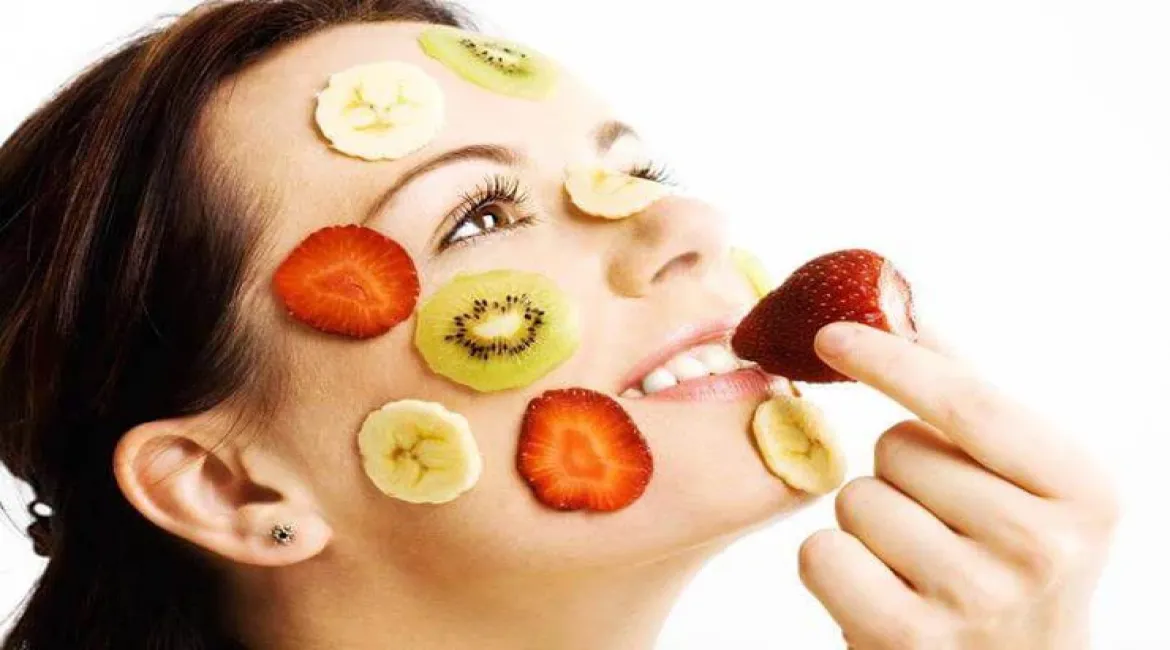
Skin is the largest organ of our body. Hypodermis, dermis, and epidermis are the three layers of skin. The Epidermis is the outer layer, which helps to protect us from sunlight, pollution, excess water loss, etc.
Clear, glossy and smooth skin is everyone’s wish because this is the only part of our body that is exposed socially. Acne, sunburn, pimples, rashes, dry skin are very common for most of people and it may be caused by several reasons like the exposure of UV rays, pollution, environmental factors and lack of nutrition. Some diseases like hypothyroidism, anemia, untreated diabetes, and even some drugs like a diuretic, antihistamines can also affect the skin. To maintain healthy skin, oil and moisture are both required in a balanced way. Some studies have shown that Omega 3–fatty acids and probiotic bacteria also help in dermatitis. Therefore, to maintain good skin we need to consume good nutrients.
Now, let us discuss about nutrients, which play a role to maintain healthy skin:
1. Vitamin A:
Vitamin A is a fat-soluble vitamin, which is stored in the liver. It plays a major role in growth and development, vision, good immune system, and dermatology.
Retinol, Retinal, Retinoic acid, and Beta-carotene are the organic compounds of vitamin A. Retinoic acid is used to remove wrinkles and acne treatments. It also helps to maintain good skin by replacing the mature epidermal cells by immature skin cells.
Recommended Dietary allowances according to NIN (National institute of Nutrition, Hyderabad):
For men: 600 mg/d (Retinol) and 4800 mg/d (β-carotene)
For women: 600 mg/d (Retinol) and 4800 mg/d (β-carotene)
For pregnant: 800 mg/d (Retinol) and 6400 mg/d (β-carotene)
For lactation: 950 mg/d (Retinol) and 7600 mg/d (β-carotene)
For infants (0-6 months): 350 mg/d (Retinol) and - (β-carotene)
(6-12 months): 350 mg/d (Retinol) and 2800 mg/d (β-carotene)
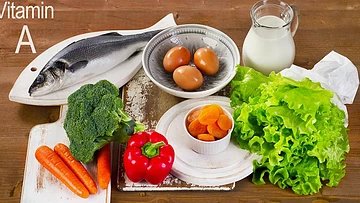
Food sources:
Retinol is found in animal-based food products and Beta-carotene can be found in fruits and vegetables.
Animal-based foods: Cod-liver oil, liver of lamb, beef, egg, crab muscle, milk, etc. Vegetables, fruits, and others: Carrot, spinach, radish leaves, coriander leaves, mint, curry leaves, drumstick leaves, mace, pepper dry (black), apricot fresh, mango, orange, persimmon, butter, ghee, etc.
2. Vitamin D:
Vitamin D is also a fat-soluble vitamin. “Calcitriol” is the active form of vitamin D, which helps in the absorption and utilization of calcium and reduces the inflammation of the skin, which is good for skin health.
Vitamin D3 (cholecalciferol) is produced in our skin due to exposure to sunlight. Studies have shown that around 10-15 minutes of exposure to sunlight twice a week is enough to produce a sufficient amount of vitamin D in our skin. In winter, people ate some places around the world are not able to produce a sufficient amount of vitamin D due to limited sunlight. Therefore, they need to consume Vitamin D in a dietary form. Not only those people, but everyone may consume an adequate amount of vitamin D to maintain good bone health. Vitamin D2 (ergocalciferol) is also another form of vitamin D, which comes from food sources.
Recommended Dietary allowances:
People who are sufficiently exposed to sunlight do not need to take vitamin D in a dietary form. People who have a deficiency of vitamin D they need to consume Vitamin D rich foods or medicinal supplements.
According to the US Institute of Medicine, 400-800 IU or 10-20 micrograms are recommended for individuals on a daily basis. People who are not able to produce naturally produce a sufficient amount of vitamin D may consume vitamin D supplements.
Food sources:
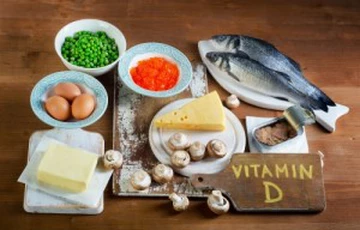 Vitamin D is usually not present in foods naturally. Few food items are there which contain vitamin D naturally.
Vitamin D is usually not present in foods naturally. Few food items are there which contain vitamin D naturally.
Natural sources: Mushrooms, fish liver oil, egg yolk, etc. contain vitamin D.
Fortified foods: Processed foods like some dairy products, soya milk, cheese, some fruit juices, and some cereal products contain vitamin D by fortification.
3. Vitamin C:
Vitamin C is an essential element, which plays a major role in tissue repair, improves the immune system, heals wounds, reduces aging factors, and protects the skin from UV radiation comes from sunlight. Vitamin C is also known as a strong antioxidant, which also helps to stimulate collagen synthesis.
Recommended Dietary allowances:
According to NIN (National Institute of Nutrition, Hyderabad):
Adult male and female - 40 mg/d, Pregnant woman – 60mg/d, Infant – 25mg/d
According to WHO (World Health Organization):
45 mg /d or 300 mg / week
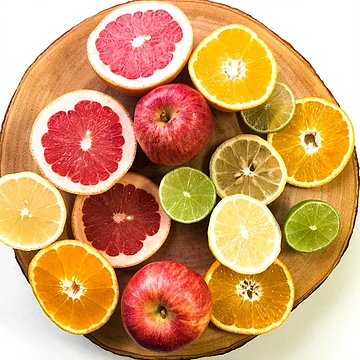
Food sources:
Animal-based foods: Vitamin C is usually found in plant-based foods. Some fishes like koi, rohu, tengra, and chicken liver, sheep liver, etc. contain some amount of vitamin C. However, during cooking, vitamin C is mostly destroyed. So the value is reduced in animal-based foods.
Fruits and vegetables: Cabbage, beet greens, coriander leaves, drumstick leaves, bitter gourd, capsicums, green chilies, amla, cashew fruits, guava, lime, lemon, orange, ripe papaya, strawberry, etc. are the very good sources of Vitamin C.
4. Zinc:
Zinc is an essential mineral, which helps to maintain human skin both from inside and outside. It also helps to maintain protein structure, wound healing, cell division, and skin lesion. During injuries, zinc helps to produce new cells and transfer into the wounded area to fast recovery and protect from infections. It also played a role to protect skin from UV- rays and pollution.
Recommended Dietary allowances:
According to NIN (National Institute of Nutrition, Hyderabad):
Adult male: 12 mg/d, Adult female and pregnant woman: 10mg /d, Lactating woman: 12mg /d
According to the United States:
Adult male: 11mg /d, Adult woman: 8mg /d, Pregnant and lactating woman: 11-13 mg/d (increase on demand, depending upon age).
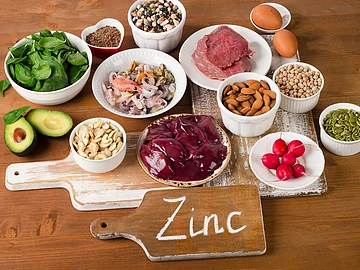
Food sources:
Bajra, Maize, Bengal gram (whole), Black gram, Lentils, Rajma, Almond, Cashew nuts, Groundnut, Mustard seeds, Sunflower seeds, Green chilies, Coriander seeds, Cumin seeds, Fenugreek seeds, Poppy seeds, etc. are good sources of zinc.
Medical purpose: Zinc can also be consumed as a supplement. People who have zinc deficiency can consume zinc tablets as per doctor’s instructions.
Therefore, these are some important nutrients, which help to keep your skin shiny, glossy and healthy naturally. So, you need to include these nutrients in your diet. Along with that, you need to take special care of your skin especially in summer-like; use sunscreen lotions, carry an umbrella, cap, etc.
References:
1.https://medicine.yale.edu/dermatology/dermsurg/Chapter%2010%20Healthy%20Nutrition%20and%20Your%20Skin_36899_284_5_v1.pdf
2. https://www.lifeextension.com/magazine/2010/6/optimal-skin-protection-with-vitamin-d/page-01
3. https://www.medicalnewstoday.com/articles/263176.php
4. https://en.wikipedia.org/wiki/Zinc#Dietary_supplement
5. https://en.wikipedia.org/wiki/Vitamin_D
6. https://en.wikipedia.org/wiki/Vitamin_C#cite_note-isbn92-4-154612-3-58










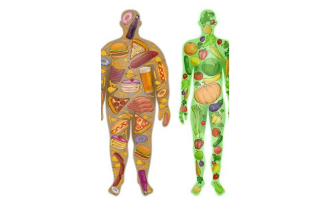

0 Comments